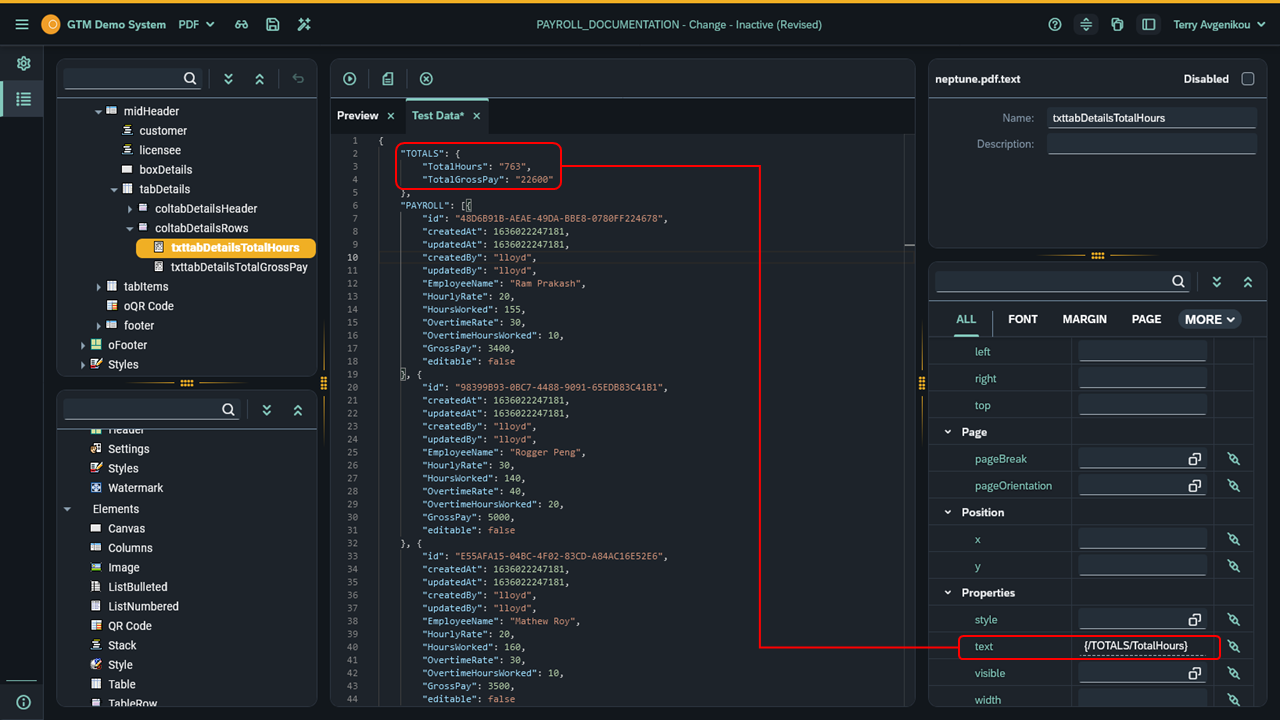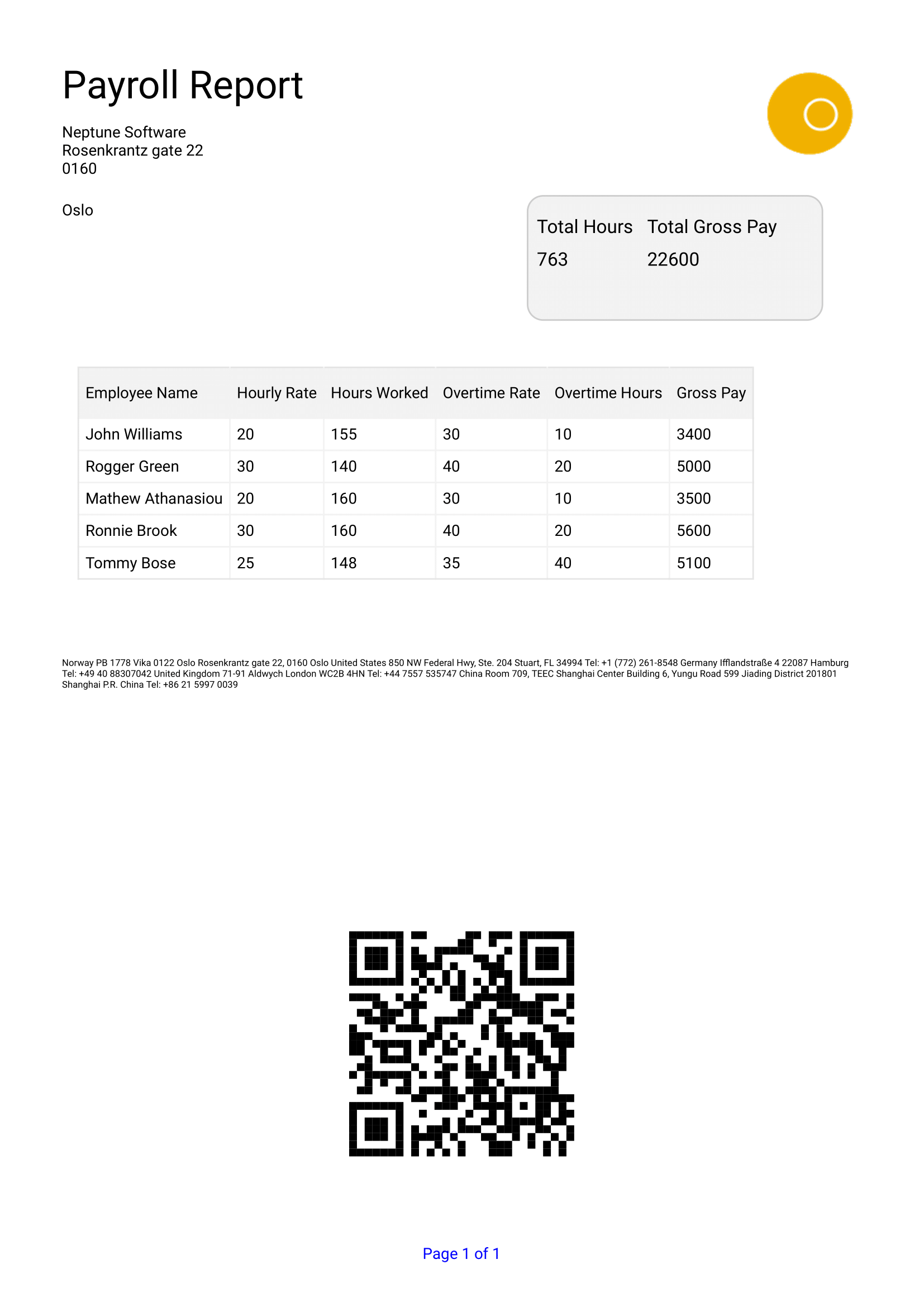Generate a PDF via a script
Generating a PDF through a script allows the user to customize the PDF given a specific PDF Template
Prerequisites
-
You have created a PDF template
-
You are familiar with scripts
Procedure
Step 1. Create a PDF template
-
Open PDF Designer and create a new template
-
Design the PDF and bind the components accordingly to your JSON structure.

| Best practice: To see how the bindings reflect on your PDF, populate the Test Data within the PDF Designer with mock data. This will automatically apply to the preview of your PDF within the designer. |
-
Save the template
Step 2. Set the script
-
Create a new script.
-
Paste the below code:
// At pdfName pass the name of the template and in the body, pass any data as the payload
try {
const payload = { // the data the will be passed in the PDF
"TOTALS": {
"TotalHours": "763",
"TotalGrossPay": "22600"
},
"PAYROLL": [{
"id": "48D6B91B-AEAE-49DA-BBE8-0780FF224678",
"createdAt": 1636022247181,
"updatedAt": 1636022247181,
"EmployeeName": "John Williams",
"HourlyRate": 20,
"HoursWorked": 155,
"OvertimeRate": 30,
"OvertimeHoursWorked": 10,
"GrossPay": 3400,
"editable": false
}, {
"id": "98399B93-0BC7-4488-9091-65EDB83C41B1",
"createdAt": 1636022247181,
"updatedAt": 1636022247181,
"EmployeeName": "Rogger Green",
"HourlyRate": 30,
"HoursWorked": 140,
"OvertimeRate": 40,
"OvertimeHoursWorked": 20,
"GrossPay": 5000,
"editable": false
}, {
"id": "E55AFA15-04BC-4F02-83CD-A84AC16E52E6",
"createdAt": 1636022247181,
"updatedAt": 1636022247181,
"EmployeeName": "Mathew Athanasiou",
"HourlyRate": 20,
"HoursWorked": 160,
"OvertimeRate": 30,
"OvertimeHoursWorked": 10,
"GrossPay": 3500,
"editable": false
}, {
"id": "13CF51AF-4140-429D-8B87-BFD2576CB537",
"createdAt": 1636022247181,
"updatedAt": 1636022247181,
"EmployeeName": "Ronnie Brook",
"HourlyRate": 30,
"HoursWorked": 160,
"OvertimeRate": 40,
"OvertimeHoursWorked": 20,
"GrossPay": 5600,
"editable": false
}, {
"id": "5FEC9162-5BB5-462F-9004-E0D7017B08DA",
"createdAt": 1636022247181,
"updatedAt": 1636022247181,
"EmployeeName": "Tommy Bose",
"HourlyRate": 25,
"HoursWorked": 148,
"OvertimeRate": 35,
"OvertimeHoursWorked": 40,
"GrossPay": 5100,
"editable": false
}]
}
const objectKey = Date.now().toString().substr(0, 10);
const securityKey = uuid(); // giving it a unique ID
const pdfBase64 = await p9.pdf.generatePdf({ // p9 core function that generates PDF
pdfName: templateName, // name of the PDF Template
objectKey: objectKey,
securityKey: securityKey,
body: payload
});
console.log(pdfBase64) // this is the PDF is base64. You may store this in a table to use it in apps and much more
console.log(objectKey) // use this to locate the PDF in PDF Archive
}
catch (e) {
console.log(e.toString())
} finally {
complete();
}-
objectKey is used as a key value.
-
securityKey is used as a unique identifier.
| These object keys are not case-sensitive. |
These values can be seen in PDF Archive.

You can send the PDF in an email if you have configured the SMTP settings in System Settings.
const attachment = {
filename: "give-a-name.pdf",
content: pdfBase64,
encoding: 'base64',
};
const responseEmail = await sendEmail(
"to-email@example.com",
"Subject",
null,
"from-email@example.com",
"add-here-the-id-of-the-email-templete",
[attachment]);